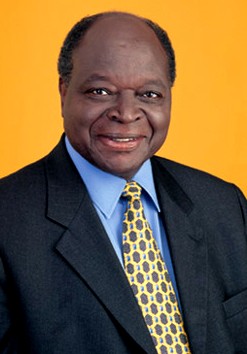Mary L. Dudziak: What a Constitutional Crisis Looks Like (Re: Kenya)
"We  are in a constitutional crisis," Kenya opposition leader Raila Odinga said today, as the Kenya election crisis continues to unfold. There was much debate about whether a constitutional crisis was unfolding when the United States faced its own presidential election debacle in 2000. The Kenya news, in contrast, is often collapsed into a simpler story about tribal violence. This tends to reinforce the dominant narrative of Africa as a region of unending despair, where legal reform seems hopeless. South Africa, with courts that look familiar to us, is held out as an exception.
are in a constitutional crisis," Kenya opposition leader Raila Odinga said today, as the Kenya election crisis continues to unfold. There was much debate about whether a constitutional crisis was unfolding when the United States faced its own presidential election debacle in 2000. The Kenya news, in contrast, is often collapsed into a simpler story about tribal violence. This tends to reinforce the dominant narrative of Africa as a region of unending despair, where legal reform seems hopeless. South Africa, with courts that look familiar to us, is held out as an exception.
Although tribalism is an element of the Kenya story, with members of smaller tribes acting on age-old resentment toward the Kikuyu, who have dominated Kenya politics since independence, it is also a political crisis, and Kenya politics in the last decade have unfolded in the context of an on-going debate about constitutional reform. The branch of government at the center of constitutional debates has not been the judiciary, but the executive.
"Big man" politics dominated Kenya for decades. The release from detention of Jomo Kenyatta became a demand of the independence movement in 1960-61, and Kenyatta himself, who would become the nation’s first President, was a focus of Kenya nationalism as different tribes in the colony joined together as a nation for the first time. Kenyatta would lead the nation until his death in 1978, when Vice President Daniel Arap Moi took the reins of power, only to release them after two decades of autocratic rule when post-Cold War democratic reforms swept the world.
As Kwasi Prempehhas illustrated here and here, the most interesting story in contemporary African constitutional politics is not what courts are doing, but the role of structural constitutional limits on the executive, and the troublesome persistence of"imperial" presidencies.
The scope of presidential power was central to recent efforts to rewrite the Kenya constitution. President Mwai Kibaki, initially elected on a platform that endorsed constitutional proposals that would limit his power, stepped back from this pledge after his 2002 election. His constitutional proposals maintaining a powerful presidency were rejected by voters in a constitutional referendum in 2005. The 2007 elections occurred against this backdrop of national debate over the nature of the Kenya presidency.
"Many Kenyans thought that last week’s election would mark a watershed in the country’s political history," writes Robin Lustig,"the moment when leadership passed to a new generation. They feel robbed by the old guard, the elite who have held on to power for so long." Whether constitutionalism is on track in Kenya turns on whether presidents cede power following regular, multi-party elections. So it is not just tribal rivalries that are at stake in Kenya today, but whether the promise of constitutional reform, and the basic practice of democracy, has meaning in Kenya.
In recent news, African Union leader, Ghanaian president John Kufuor, is traveling to Kenya to mediate. As in the recent Pakistan crisis, lawyers are playing a role, with the Law Society of Kenyacalling upon Kibaki to step down.
What role does the United States play in this? During the Cold War, the United States turned a blind eye toward human rights abuses under Kenyatta, in the interests of maintaining ties with a Cold War ally. A question we must ask about current interventions in Africa and elsewhere is whether the"war on terror" drives the U.S. to support reliable friends and to ignore their failings. The U.S. appears to be playing a helpful role in the current crisis, with United States assistant secretary of state for Africa Jendayi Frazertraveling to Kenya to promote mediation between the parties."The people of Kenya were cheated," she said.
The U.S. aim of promoting democracy around the world is better served by promoting democratization, including fair elections, rather than the Cold War model of supporting loyal allies.